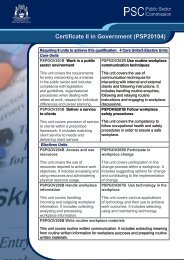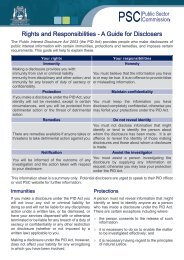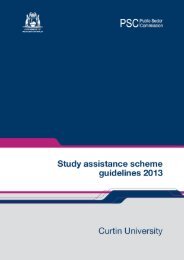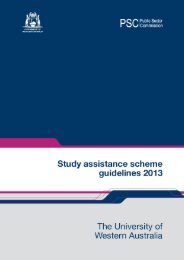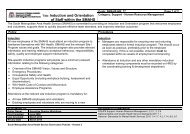Archived document - Public Sector Commission - The Western ...
Archived document - Public Sector Commission - The Western ...
Archived document - Public Sector Commission - The Western ...
Create successful ePaper yourself
Turn your PDF publications into a flip-book with our unique Google optimized e-Paper software.
e-Government Strategy for the <strong>Western</strong> Australian <strong>Public</strong> <strong>Sector</strong><br />
Effecting Change: <strong>The</strong> Key Enablers of e-Government<br />
36<br />
4. Citizen-Centric Approach<br />
<strong>The</strong> first principle of e-government is that ‘services and information will be<br />
designed and focused on the needs of <strong>Western</strong> Australians’. As has been<br />
discussed, changing the agency-centric approach within the public sector<br />
to one of citizen-centricity is a vital step toward achieving e-government.<br />
Putting citizens first in<br />
determining service delivery<br />
ICT is emerging as a vital tool in<br />
approaches involves many<br />
building social capital and considerations. Government<br />
not only has to understand<br />
community sustainability... the needs of citizens, but also<br />
A recent pilot project, based in be able to identify their<br />
preferences such as: their<br />
the South West of the State, most convenient means for<br />
accessing services, the<br />
examined this issue. <strong>The</strong> project<br />
channels for delivery they<br />
utilised ICT to build a<br />
have available to them, and<br />
how they perceive their<br />
community of interest for<br />
service delivery choices.<br />
parents, child healthcare For government to<br />
professionals and relevant understand the needs of<br />
citizens and identify their<br />
government agencies. <strong>The</strong> ICT preferences it needs to<br />
actively engage with citizens.<br />
infrastructure enabled them to<br />
share information and expertise<br />
on parenting and healthy child<br />
rearing in a safe and secure<br />
environment.<br />
This engagement is not just limited to identifying their service delivery<br />
requirements, but also provides a vehicle for citizens to actively contribute<br />
to government decision-making at both the ministerial and agency levels.<br />
Government must make decisions on a range of issues and the challenge<br />
will be to ensure that those citizens most directly affected and interested<br />
in a specific issue are identified and consulted so as to consider their<br />
views in the decision-making process.<br />
Accessibility to government services in an e-government environment will<br />
require agencies to provide citizens with a choice of service delivery<br />
channels. It is important to note that ICT incorporates a number of<br />
different technologies each with their own benefits and appeal of access<br />
to different user groups. Channels such as Short Message Service (SMS)<br />
technology, digital TV and data casting may all be employed in an effort to<br />
achieve e-government service delivery transformation.<br />
To achieve e-government transformation will require <strong>Western</strong> Australians<br />
to have access to affordable and appropriate telecommunications<br />
technology. For many living in regional areas this access is limited,<br />
therefore telecommunications represents a significant challenge for the<br />
Government of <strong>Western</strong> Australia. <strong>The</strong> task facing the Government is to<br />
ensure that the citizens of this State receive an equitable allocation of<br />
federal funding for telecommunications infrastructure resources, and that<br />
the effect of the ‘digital divide’ between those people who have access to<br />
appropriate technology to meet their needs and those who do not<br />
is reduced.<br />
ICT is emerging as a vital tool in building social capital and community<br />
sustainability. Research undertaken in Australia and overseas shows that<br />
ICT offers considerable potential for impacting positively on the economic<br />
and social well being of communities. Amongst other applications it can<br />
be used to support communities of care and communities of interest at<br />
local levels. A recent pilot project, based in the South West of the State,



